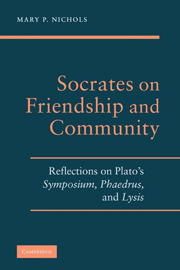Book contents
3 - Self-Knowledge, Love, and Rhetoric (Plato's Phaedrus)
Published online by Cambridge University Press: 06 January 2010
Summary
The issue of self-knowledge arises in the Phaedrus in various ways. This is the dialogue in which Socrates says that he follows the injunction to “know thyself” that is written on the temple at Delphi, and that this task leaves him no leisure for other things (229e). Later, he describes how lover and beloved come to see themselves in each other as a result of their love. And in the last half of the Phaedrus, he and Phaedrus discuss the three speeches about love that they have just delivered in the first half of the dialogue. The self-reflective character of the Phaedrus is highlighted when contrasted to the Symposium: instead of engaging in a discussion of their own speeches, the symposiasts are treated to stories about Socrates from a drunken Alcibiades, who has been disappointed in love. Although Socrates talks to the poets at the end of the evening about comedy and tragedy, they are falling asleep.
Because Socrates' and Phaedrus' discussion of rhetoric includes a discussion of writing, moreover, the Phaedrus serves as Plato's reflection on his own activity of writing dialogues. Socrates in fact offers a standard of good writing: it should be constructed as if it were a living animal, “neither headless nor footless, but with middle [parts] and extremities, written appropriately to each other and to the whole” (264c).
- Type
- Chapter
- Information
- Socrates on Friendship and CommunityReflections on Plato's Symposium, Phaedrus,andLysis, pp. 90 - 151Publisher: Cambridge University PressPrint publication year: 2008



